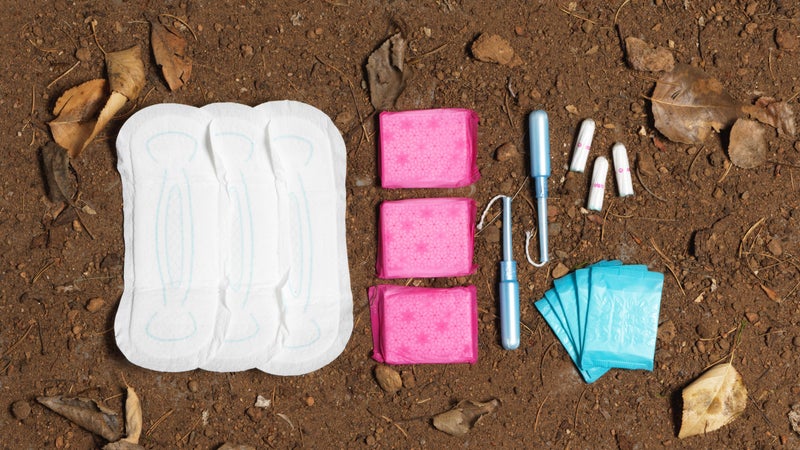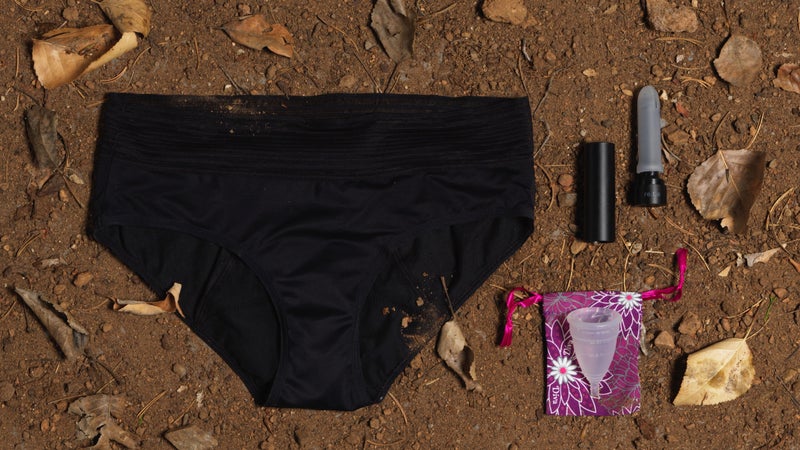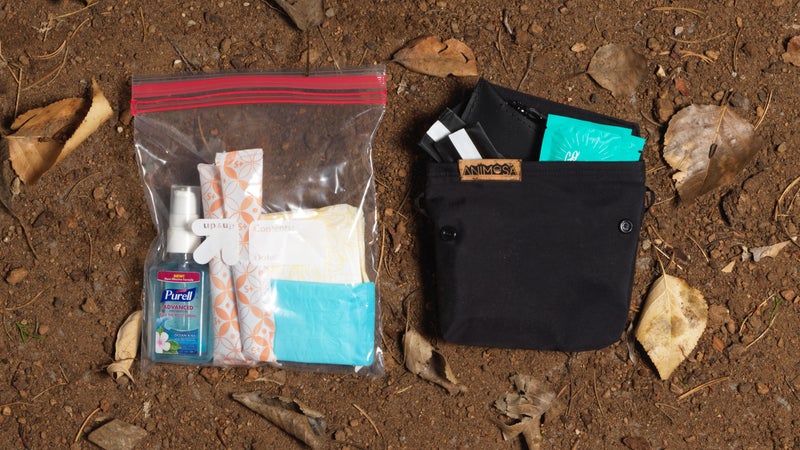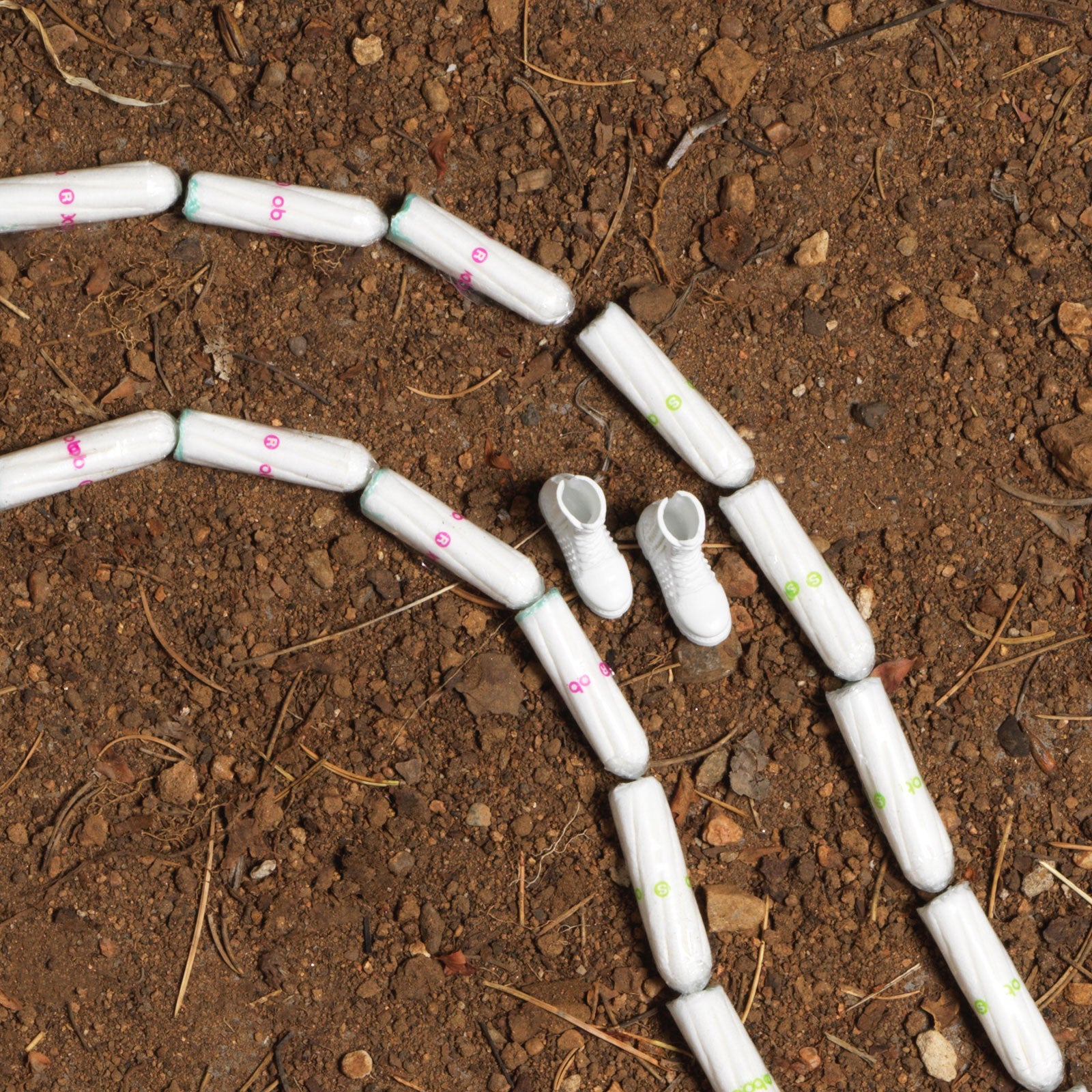Going outside inevitably impacts the environment, whether all that remains are your footsteps—as (LNT) would encourage—or you’re treating nature as your personal trash can and compost pile. And having your period while backpacking or camping only makes it harder to reduce that impact.
So we talked to Erin Collier, a who’s been working in environmental stewardship for more than four years for the U.S. Forest Service and Bureau of Land Management, and Kristina Tocce, the medical director at Planned Parenthood of the Rocky Mountains. They helped us put together a list of gear hacks and principles for heading outdoors while menstruating.
Know the Basics
In accordance with , don’t leave anything not created by your body—including tampons and toilet paper—in nature. Keep this in mind if you’re going on a trip where you won’t see a garbage can for a while, as you’ll have to carve out space and weight in your pack for used pads and tampons.
As for what you can leave behind, it shouldn’t remain above ground for another person or animal to find. Always dig a six-to-eight-inch-deep hole () at least 200 feet, or 70 big steps away, from a water source, dump all bodily fluids and the water used to clean your period supplies inside it, and fill it back in.
And don’t just throw period supplies into pit toilets. In comparing rates of decomposition, “the closest thing to a tampon is a disposable diaper, which takes about 450 years,” Collier says, citing a . Even the organic or biodegradable kind still take a long time to break down. So if you leave a tampon or pad in a pit toilet, it could be found by animals. Or rangers would have to remove it, which is extremely difficult.
Pick Disposable or Reusable Supplies
There are benefits and downsides to both options. Disposable pads and tampons may actually be better for following LNT practices, since they absorb everything and you can pack it all out rather than needing a cathole. Reusable menstrual cups and period panties are more affordable, comfortable, and (in the long run) friendlier to the environment than disposables. Plus, while pads and tampons can fall out, get sweaty, or chafe, you won’t notice a cup except for when you’re emptying or reinserting it. Both reusable options will add less weight and take up less space in your pack, though period underwear can get uncomfortable if not washed properly. Here are several important things to consider before choosing.
Disposables

Tampons
If you opt for disposables, Collier recommends removing tampon applicators before you leave for your trip, or purchasing applicator-free tampons. Out of anything obviously period related she sees left in the backcountry, tampon applicators are the most common.
But if you’re set on using an applicator, Thinx recently released an ultralight, ultra-packable, reusable one called ($60). To operate it, twist off the cap, place a tampon into the silicon holder, and use the pusher to insert the tampon and holder into your vagina. Keep a finger or thumb on the holder and pusher so that once the tampon is in, you can pull both out.
Pads
Pads can cause some serious chafing if you’re walking with them for more than a mile or two. Add some ($5) to your pack if pads are your gear of choice, and apply it to your inner thighs before you start hiking.
Reusables

Menstrual Cups
Menstrual cups like the ��($17),�� ($40), or ($28) are silicon period-blood receptacles. Make sure to order the right size, which depends on your flow and the size of your vagina. (Some companies make specific models for women under the age of 18, over 30, .) Talk to your ob-gyn if you’re unsure about which size you should get.
You’ll have to time emptying the cup based on how heavy your period is on a certain day. But usually, you’ll be able to feel if it gets full or when it starts to leak—the Diva Cup has tiny holes at the top in case of overflow. And all three brands recommend leaving the cup in no longer than 12 straight hours. Don’t worry about losing it up there, though; a cup can’t fit through a cervix, and most have a small tab on the bottom for easy gripping and removal.
Collier recommends taking extra water with you for cleaning your cup after you empty it into a cathole. Use a designated pot or bowl, and clean the cup with soapy water. Then dump the dirty water into the same hole before covering it up.
Period Underwear and Shorts
Period panties are highly absorbent, leakproof, often sweat wicking and odor reducing, and more comfortable for a long day of hiking than pads and tampons.
carries multiple styles, like hip-hugger, sport, and thong. It also makes ��($65), with built-in underwear and pockets, perfect for running or yoga. Companies like ,��, and also make solid period underwear, if you’re looking for less expensive and more varied options. (Knix offers a variety three-pack for $56, while one pair of Thinx hip-huggers will run you $34.)
Though period underwear can be more difficult to clean than cups, it’s useful as backup to other methods on heavy days. To clean, wring out the blood into a cathole, wash the panties thoroughly in your designated bowl or pot, and empty the used water into the hole.
If you choose to go with period panties, get at least two pairs, so you can use one while the other is drying out, says Tocce. One pair can usually absorb up to a day’s worth of heavy bleeding, but this depends on the type of underwear you buy—some are intended to be more absorbent than others.
Other Options
Many women turn to birth-control pills and hormonal IUDs to either stop periods completely, lighten flow, or regulate side effects during extended trips. These are probably the most sustainable, hassle-free, and space-saving methods. However, they are not an option for all women. If you use birth-control pills, talk to your doctor far in advance of your trip, so they’ll know you’ll need extra prescriptions. On the trail, keep them in a secure, designated spot in your pack, and set yourself a reminder on your watch or phone to take them every day, just as you might when you’re at home.
Stay Organized

If you’re using disposable items, make your own kit with two sealable Ziplocs: one with fresh toilet paper, pads, tampons, and hand sanitizer, and the other for used products. For extra privacy, wrap the second bag in duct tape and add tea bags or crushed aspirin to cut down on the smell.
But there are also premade packs, like those by Animosa, that do all this work for you with reusable or refillable supplies. The company’s ($54 for the largest size) comes with a waterproof carrying case, hypoallergenic wipes, sealable and biodegradable disposal bags, and a reusable pouch to keep them in. It’s available in three sizes—one for single-day trips, another for multi-day adventures, and a third for a multi-week stays in the wild.
Say you prefer reusable gear. Then your kit should also include extra soap, water, and a designated bowl for cleaning the menstrual cup or period panties, as well as another storage bag for when you’re not using them.
Be Flexible
Both Collier and Tocce said they got most of their knowledge by word of mouth. But they also mentioned that they wish they’d known these things sooner. Every body and every period is different. For a while, one method might work for you, until your cycle changes and you adapt. As Collier says, “There’s nothing wrong with getting outside on your period.”


